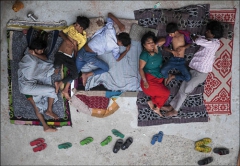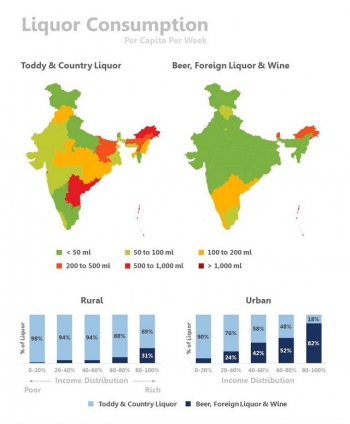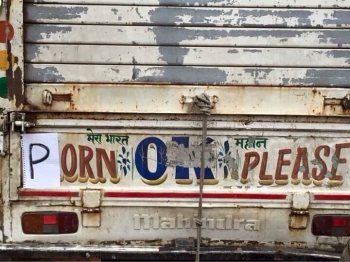10/12/2015
Sleep baby sleep... (Sleeping in India and in France)
A friend (Indian) came home unexpectedly on Saturday night at 9 PM. When he ‘complained’ about Baby Samurai not being available for play, I explained that he had been sleeping for an hour already. To which he answered: “Are you German or what, that he needs to have a schedule?” That says it all…
Sleep is one of the largest cultural differences between India and France, according to me.  For example, an Indian can easily talk to you while you are asleep, or clean your room, or even bring you a chai. And nobody would think of closing the door of the bedroom when starting a movie full volume in the room next door. The few times I allowed myself to sleep late, like until 11, my favorite Indian was all over the place, and came and disturbed me several times...
For example, an Indian can easily talk to you while you are asleep, or clean your room, or even bring you a chai. And nobody would think of closing the door of the bedroom when starting a movie full volume in the room next door. The few times I allowed myself to sleep late, like until 11, my favorite Indian was all over the place, and came and disturbed me several times...
It must be linked to the living conditions: as many people live in very small spaces, no one can afford the luxury of a beautiful uninterrupted nap, or in silence (to be fair, it is better they learn from an early age to sleep through the noise in India, it is quite a matter of survival). In India people sleep because they have to, they do not indulge in the comfort of resting. However it is a little less true regarding food, yet another physiological need.
The same goes with babies (1). They follow the rhythm of the household. Even worse: If parents work a lot, it is not uncommon that a baby stays awake till past midnight in order to spend some time playing with his father.
In India, the child sleeps with his mother. And therefore, theoretically, with his father. Unless the latter doesn’t want to be woken up (by the baby’s cries or kicks), in which case he will go sleep wherever he can (on the floor, on a mattress, in another bed or on the couch). I know a lot of such cases. About the couple intimacy? Well, even before there is a baby, it is already quite an unusual concept (once again probably because of the ‘sardines’ way of life and also of the arranged marriage). And even if it was, the baby comes first. And he must sleep with his mother, to be able to suckle ad libitum and to ‘create bonds of love’. In such a context, the baby doesn't need to learn to fall asleep by himself nor to go back to sleep on his own; and they don’t let him cry more than two seconds. The baby is King in India, at least the first two-three years (after that it becomes less funny, with a strong reality check for what is coming ahead).
That mothers end up exhausted from continuously waking up from kicks or a greedy suckling mouth, nobody cares (at least after the first 3 months where they are well looked after by their mothers, so that they recover well from the physical hardship that giving birth is).
You have guessed, I was one of these wron-out mothers, since Baby Samurai had decided that sleeping at night was good for fools, the day he turned 4 months. well he was sleeping, but would wake up every two hours (at best). In addition we traveled quite a lot, and he often slept in our bed. At 5 months I did try the Tracey Hogg method to teach him to fall asleep by himself, but I was already too weak from sleep deprivation to withstand an hour of crying and I decided that 1. He was too small, 2. Westerners were a little too harsh in the way they (we) educate the babies, 3. The French are quite cold-hearted to leave a newborn alone in his bed in his room the first night itself.
And there I became sleep deprived, crazed. Not depressed, but a real zombie. My goal every day was to pull the wool over my colleagues’ eyes (and master the technique of sleeping with eyes open). I must say that in addition to micro-nights, I had to deal with breastfeeding. And breastfeeding is good, but it is not always easy: it takes of lot energy, when he feeds, and even more so when you have to express milk. I had therefore abandoned the idea that baby Samurai (and I at the same time) would one day sleep an entire night, at least not before he would leave home...
And then, one evening, a friend of mine, a French girl married to an Indian man, sent me a document to “Sleep train babies" (SleepSenseTraining (website) that she intended to try.) I explained to her that personally I had given up and I expected things to settle by themselves. But then, out of curiosity and because I had nothing else to do and I had my phone in hand, I opened the book. 45 minutes later, Baby Samurai woke up and I decided to test this technique illico presto. Just like somebody drowning clings on to a lifeline. The last chance! After crying for 45 minutes, he was sleeping soundly. And in a week’s time (with ups and downs) he was sleeping almost all through the night, more than 10 hours. I would have been told it was possible, I would have not believed it!
This being said, I did things my way. And some may argue that I am taking the best of each culture, but really, I'm just following my instincts. So we follow a bedtime routine which includes a massage, he goes to bed at 8 PM and he sleeps in his crib. On the other hand he sleeps in our room and I don't insist he falls asleep without anybody in the room; I will continue to take him in my arms to calm him down if he needs and I am a little flexible regarding the naps. I was also comforted in my approach by the little I have read about Hélène Stork’s work about ‘compared practices of mothering in the West and in other countries, including South India’ and I just ordered her book (2).
In any case, Baby Samurai sleeps and I feel alive again – in fact I'm almost tired of sleeping too much but I shall not complain shall I??
(1) Summary of the differences in mothering:
Source:https://www.Cairn.info/Revue-spirale-2005-2-page-151.htm
(2) Hélène Stork, Indian childhoods. Study and comparison of cross-cultural psychology of the young child, Paris, Paidós / Centurion, 1986
Providing medical and psychological consultation in Paris suburbs, Hélène Stork found many psychological disorders in young children. Following her strong intuition that these difficulties were representative, among others, of the malaise of an entire society, she compared the practices of mothering in the West with those of other countries, including South India (Tamil Nadu), where she stayed at length, on several occasions. Like the Ethnologist, she led extensive clinical research on the field, along with studies of ancient Sanskrit texts underlying the Indian techniques of infant care. This book, after defining cross-cultural psychology (history, methods, goals), describes with great precision (thanks, in particular, to the filmic investigation) gestures and postures of mothering in South India, bringing a rich contribution to the study of the psychic life of babies during the first six months. At the end of his work, Hélène Stork formulates a question for the West: “Does the social organization of the family allows women (parents) to practice a mothering helping in the sensory-motor development and good mental health of the child?”
08:00 Posted in Expatriation (in India and in other countries), Incredible India!, Little Samourai, My stories in India | Permalink | Comments (0) | Tags: india, sleep, hélène stork, education, baby sleep, sleep training, tracey hogg | ![]() Facebook | |
Facebook | |
09/14/2015
A story of rugby and alcohol
Any resemblance with existing persons is fictitious. Or not.
Our small family recently completed its yearly pilgrimage to Kerala.
There I had to face a situation: in India, a baby is not a person but a rugby ball. As soon as they see a baby, arms reach out, they grab him and pass him to one another. I must be a not-so-good scrum-half: at the sight of these reaching out women - which were not all pretty sights, even for me (so I could only imagine for a baby), with missing or rotten teeth, mustaches and beards - I did not let go of the ball. Just because the three pairs of arms who welcomed us scared me away, feeling totally aggressed. While it is apparently an act of “politeness” to ask to carry my child, politeness I was supposed to return by handing the child in question away. Well, to be honest with you, I didn’t care one bit about going the impolite stuck-up bitch that would not let her baby go!
And my baby played along and refused to leave my arms. Of course I don’t want him to be anti-social; I just want people to give him some time to adjust to all these new faces before being thrown into the scrum!
After holding on against almost everybody, people left us alone… I took advantage of the new found peace to let baby stretch and take a few steps. No sooner had he a foot on the ground that he got grabbed by an ‘uncle’ who had identified an opening and seized it! He got eventually passed in the arms of four women, who were not even from my husband's family...
Without transition:
Statistics show that Indians drink less than Europeans (4.3 versus 12.5 litres per year per person) except that we should remove from the equation women (who do not have the right to drink), pious men (who do not drink out of religious conviction), and all those who drink home-made alcohol, which kill mostly in silence, and sometime loudly (when more than a hundred people die, like it happened in June in Mumbai). Malayali drink 10.2 litres per year, quite far behind the guys of Andhra Pradesh (35 litres). For many Indian States, taxes on alcohol represent nearly a quarter of the State income (22% in Kerala); whereas it is less than 1% in France. This makes it difficult for States to tackle alchool consumption, as they regularly try. Only the Gujarat has been holding on tight, but the black market has been exploding. Increasing taxes (already at more than 100%) or making alcohol illegal is fine but it does not help much...

(1) In India: http://indianexpress.com/article/india/india-others/kerala-increases-tax-on-liquor-beer-and-wine/#sthash.PNIRO4yJ.dpuf ; http://articles.economictimes.indiatimes.com/2015-05-16/news/62239496_1_total-prohibition-vm-sudheeran-kerala-government ; http://www.thehindubusinessline.com/economy/the-alcohol-economy/article5436924.ECE ; http://www.thehindu.com/opinion/blogs/blog-datadelve/article6344654.ece
(2) In France: http://www.alcool-info-service.fr/alcool/consommation-alcool-france/culture-alcool-consommation-vin#.VfZl8Jf3aJ8 ; http://www.insee.fr/fr/themes/comptes-nationaux/tableau.asp?sous_theme=3.2 & xml = t_3203 ; http://next.Liberation.fr/vous/2011/02/17/Quels-sont-les-pays-qui-consomment-Le-plus-d-alcool-dans-le-monde_715595
08:00 Posted in Incredible India!, Little Samourai, My stories in India | Permalink | Comments (0) | Tags: india, kerala, baby, alcohol | ![]() Facebook | |
Facebook | |
08/09/2015
Porn or no porn??
After a smooth start (with the ban of the movie Fifty Shades of Grey) in March, the Indian Government geared up, banning porn altogether. At least online porn. The intention was good – fighting against child pornography – but the execution was, well, not up to the mark, to say the least. Without consulting anybody, overnight, they black-listed 857 sites, some have no sexual content at all; and on top of it 857 is nothing compared to the thousands of X-sites live. As on today, the ban is more or less lifted: the order has been given but it is not clear...
When you read (source) that more than 50% of the children in India are victims of sexual abuse – a small 223 million kids mind you – (and half of them molested by some family member), you get to think that the Government is only attacking the emerged part of the iceberg by targeting child porn and not enforcing sex education programs in schools...
But everything is not completely black! There are people like me who speak but do nothing, others who do not speak and do nothing and the other ones... For instance let’s take Kranti, an NGO that works with the children of Kamathipura, Mumbai 'red light district', and helps Kamathipura daughters to discover see other horizons: Sheetal, Pinky and Shweta all went to the United States, one to study drums, the other for an Art summer camp and the last one to train on psychology. (source) Some of them come back and become activist in sex education...
And then there is the Sexpert, writing in Mumbai Mirror newspaper. Don’t laugh! He also brings his stone to the wall of knowledge! Dr Watsa, a 91 fellow, has been a columnist for more than 50 years, and very recently published a book, It's Normal...  Having started by giving medical advice in women's magazines, he began to receive letters from women of remote areas, abused by uncles and worried they would not be able to marry without an intact hymen.
Having started by giving medical advice in women's magazines, he began to receive letters from women of remote areas, abused by uncles and worried they would not be able to marry without an intact hymen.
In addition to his column who makes you laugh while educating, and which brought upon his author and publisher censorship, threats etc, he worked for the Family Planning Association of India (FPAI) and the Council of Sex Education and Parenthood International (CSEPI). For the porn is a problem, but not for the same reasons as the Government (which think it ‘gives ideas’). Because men would devote more time watching it than doing their wives whose frustration would eventually lead to divorce. (Source; PDF)
Some Sexpert pearls for the road:
- Q: Two days ago, I had unprotected sex with my girlfriend. To prevent pregnancy, we bought an i-Pill [emergency contraceptive] But in the heat of the moment I popped it instead of her. Can it cause any complications for me?
- A: Next time round please use a condom and make sure you don't swallow that too.
- Q (a very common one): Will my penis shrink from repeated masturbation.
- A: You talk a lot, does your tongue shrink?
- Q (about female masturbation, recently emerging questions showing women emancipation): My friend thinks that her breasts are getting larger because of masturbation. Is this possible?
- A: No. Does she think her clitoris is an air pump?
- Q: I have a small penis and I can't seem to satisfy my girlfriend. My astrologer has advised me to pull it every day for 15 minutes while reciting a shloka [prayer]. I have been doing this for a month but it hasn't helped. What should I do?
- A: If he was right, most men would have a penis hitting their knees. God doesn't help gullible, foolish men. Go visit a sexpert instead who can teach you the art of making love.
And a small satirical video on sex education in schools in India to conclude!
08:00 Posted in Incredible India! | Permalink | Comments (0) | Tags: india, sex, sexpert, sex education, porn ban, porn, child porn, abuse, child abuse | ![]() Facebook | |
Facebook | |
















